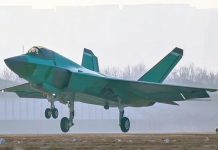Amidst the grueling warfare in Ukraine, marked by mud, trenches, and intense infantry attacks akin to those witnessed during World War I, a retired US Navy admiral has pointed out how the war in Ukraine could serve as a testing ground for artificial intelligence (AI).
Ukraine Puts Counteroffensive On Hold; Seeks More Defense Systems To Frustrate Russia’s Quest For Air Supremacy
In an opinion piece published in Bloomberg, James Stavridis, a retired US Navy admiral and former supreme allied commander of NATO, has made a compelling prediction regarding the future of AI in military operations.
Stavridis believes that fast advances in artificial intelligence (AI) will soon play a critical role in supporting decision-makers on the battlefield at all levels of the military hierarchy.
Reflecting on a devastating event from the past, the 1988 shooting down of an Iranian commercial airliner by the US Navy’s Aegis cruiser, Vincennes, the retired admiral, highlights the potential role of artificial intelligence (AI) in preventing such tragic errors.
In that terrible event, the tactical action officer’s incorrect judgment caused the civilian aircraft to be shot down, killing nearly 300 innocent people.
Stavridis, who is also the dean emeritus of the Fletcher School of Law and Diplomacy at Tufts University, said that an AI adviser capable of analyzing massive quantities of data and comparing radar information with countless comparable instances would almost certainly have properly classified the aircraft as a civilian.
Using AI in these circumstances may greatly minimize the frequency of “collateral damage” instances in which innocent civilians suffer loss. Furthermore, the retired admiral emphasizes the potential of AI in providing real-time and highly detailed strategic targeting information.
This priceless information might provide decision-makers with exact instructions on using targeted weapons at crucial points in an adversary’s supply chain.
The Libyan campaign of 2011, commanded by the admiral, illustrates how NATO struggled to prevent collateral damage and experienced poor target selection. AI’s capabilities, if employed, could have mitigated these issues more effectively.
The admiral’s observations highlight how AI technology has the potential to improve military operations by reducing civilian deaths and providing better assistance for strategic decision-making.
How Can Ukraine Incorporate AI Into Its Military Operations?
Stavridis advocated for Ukraine’s adoption of a crucial capability of artificial intelligence (AI): the ability to control large swarms of drones in synchronized attack formations, akin to how “birds flock together to scare away predators.”
By employing inexpensive and disposable drones, these coordinated drone formations could overwhelm enemy air defenses, leading to severe consequences, he added.
Implementing AI to direct drones in Ukraine can potentially deplete Russia’s diminishing armor supplies and force them to waste critical air-defense missiles.
He further noted that AI could be utilized in psychological and information warfare by creating deep fakes.
By spreading AI-generated fake images, false stories, and shadow operations, Ukraine could amplify Russia’s perception of a failing war and provoke mistaken reactions from enemy forces.
Besides offensive capabilities, AI can play a crucial role in logistics by analyzing maintenance patterns, recommending preventive maintenance measures, optimizing combat supply chains, and providing real-time logistical advice.
This advantage in leveraging AI tools for logistics can give Ukrainian commanders a significant edge over Russian opponents, the retired US Navy admiral added.
Moreover, Stavridis highlighted that AI’s ability to conduct cyberattacks could be its most dangerous attribute when facing Russian forces.
In modern warfare, where the internet is the backbone for combat operations, logistics, intelligence, and more, the ability to breach an adversary’s cyber networks holds utmost significance.

With the rapid progress of quantum computing and advanced AI systems, attaining supremacy on the cyber battlefield has become a real prospect.
However, the current state of war in Ukraine, characterized by close-quarters combat, fortified Russian forces entrenched in extensive trenches, and continuous artillery duels, evokes a sense of antiquity more fitting to the 19th century.
While the former Navy admiral proposed various ways to integrate AI into Ukraine’s operations against Russian forces, the practicalities of deploying such sophisticated technology and its associated costs remain uncertain.
Additionally, Moscow is also believed to be capable of employing AI technology. Therefore, while AI holds promise, its actual deployment and the competitive landscape warrant careful observation.
- Contact the author at ashishmichel(at)gmail.com
- Follow EurAsian Times on Google News




